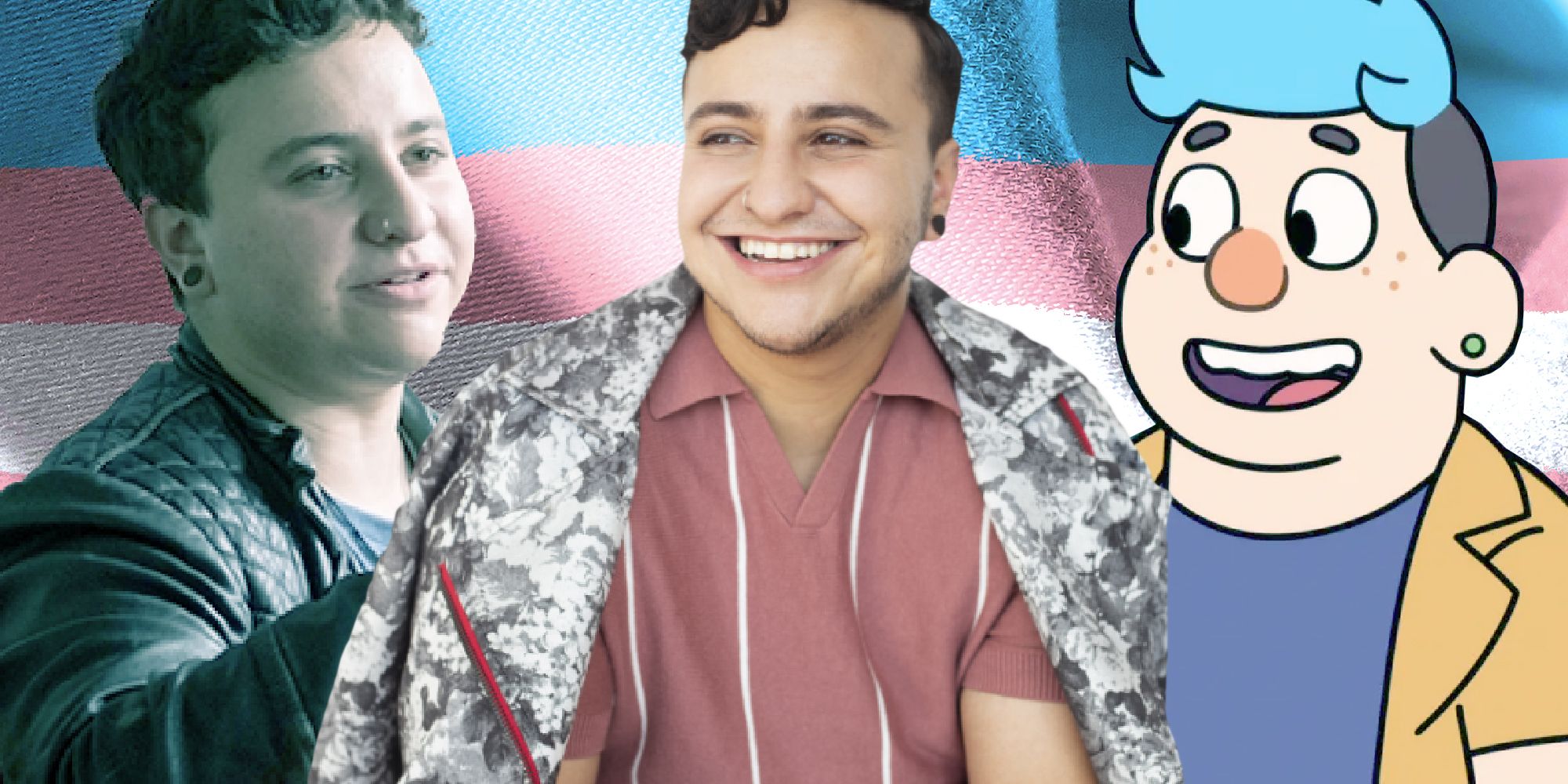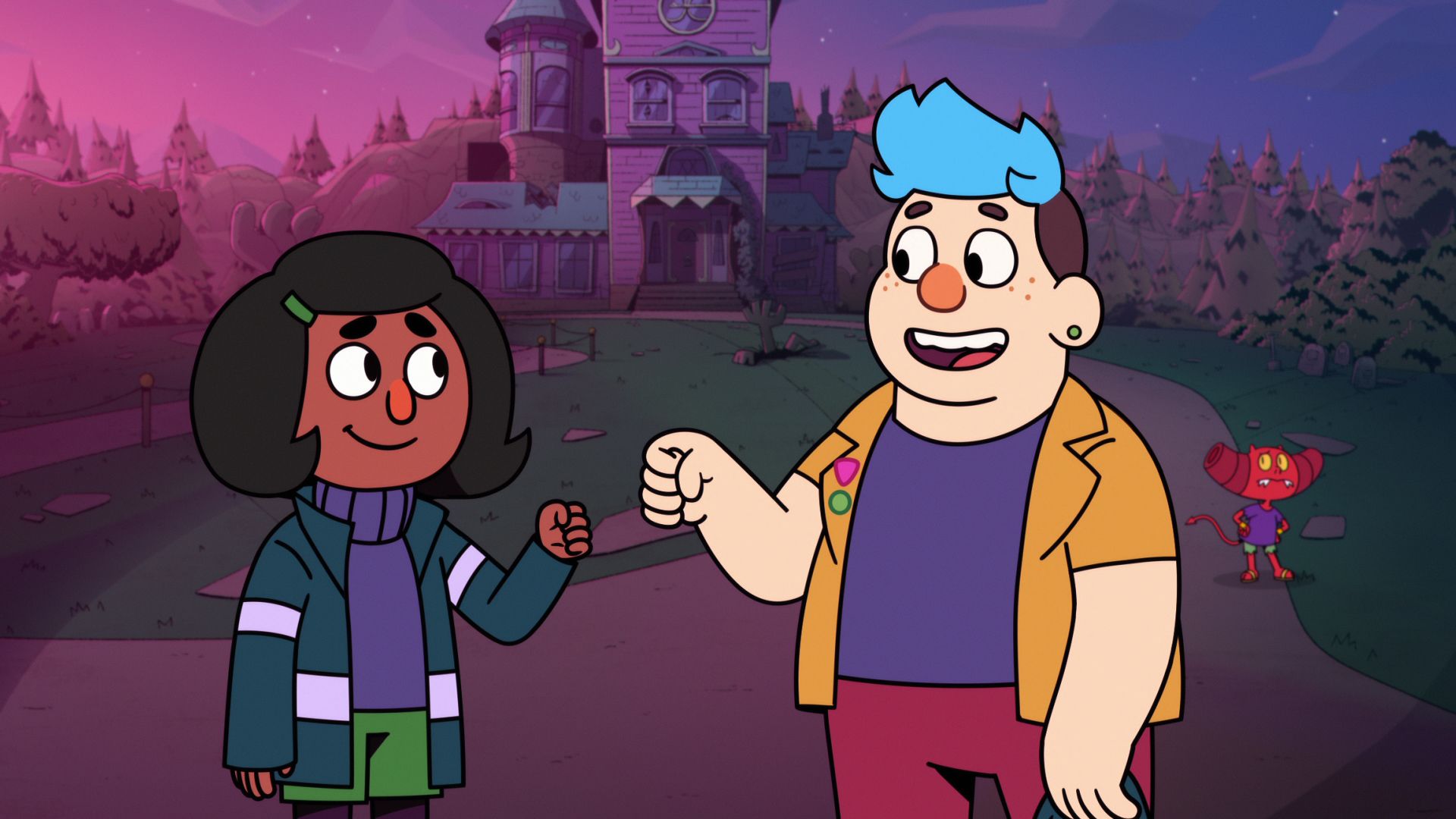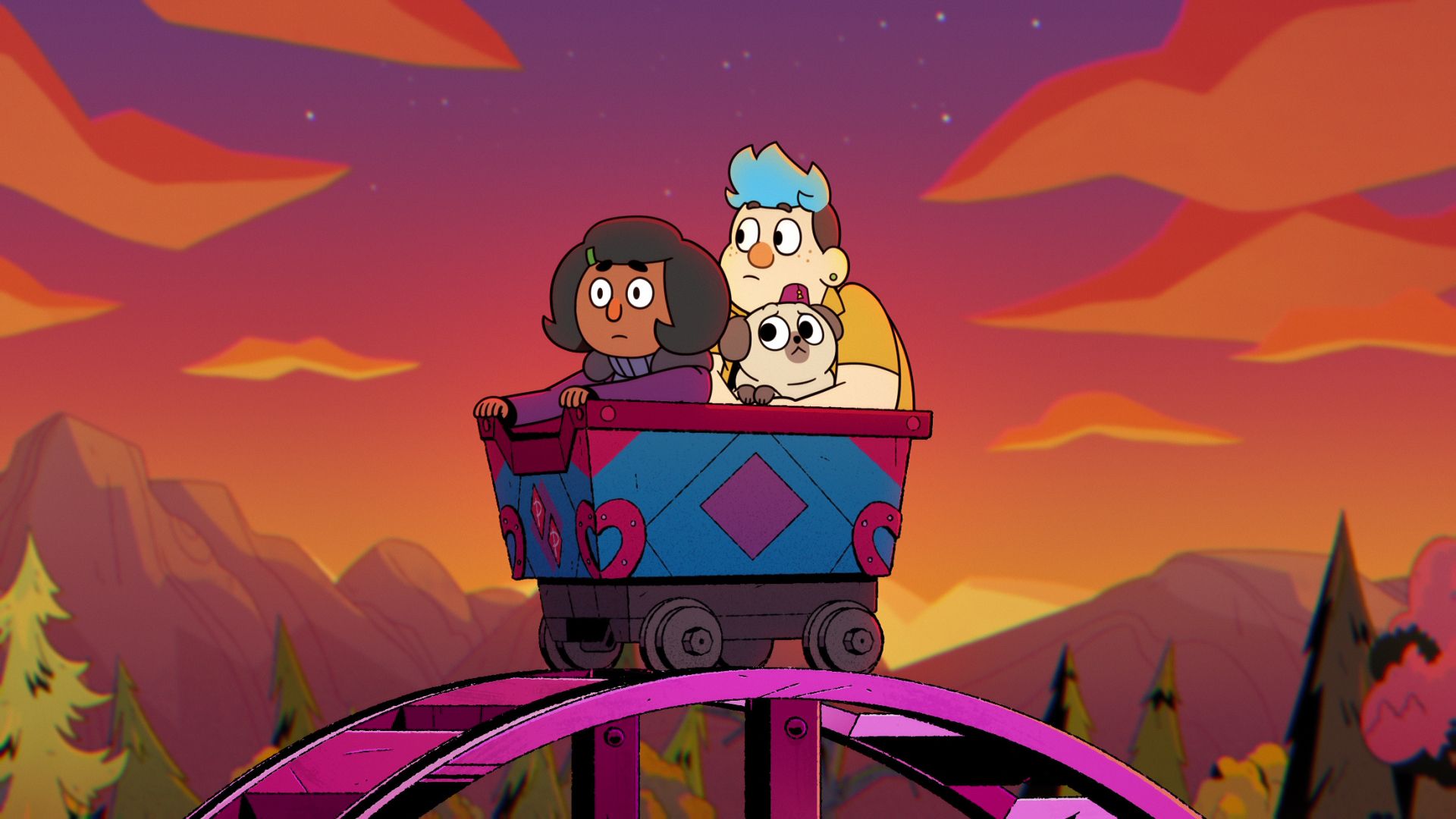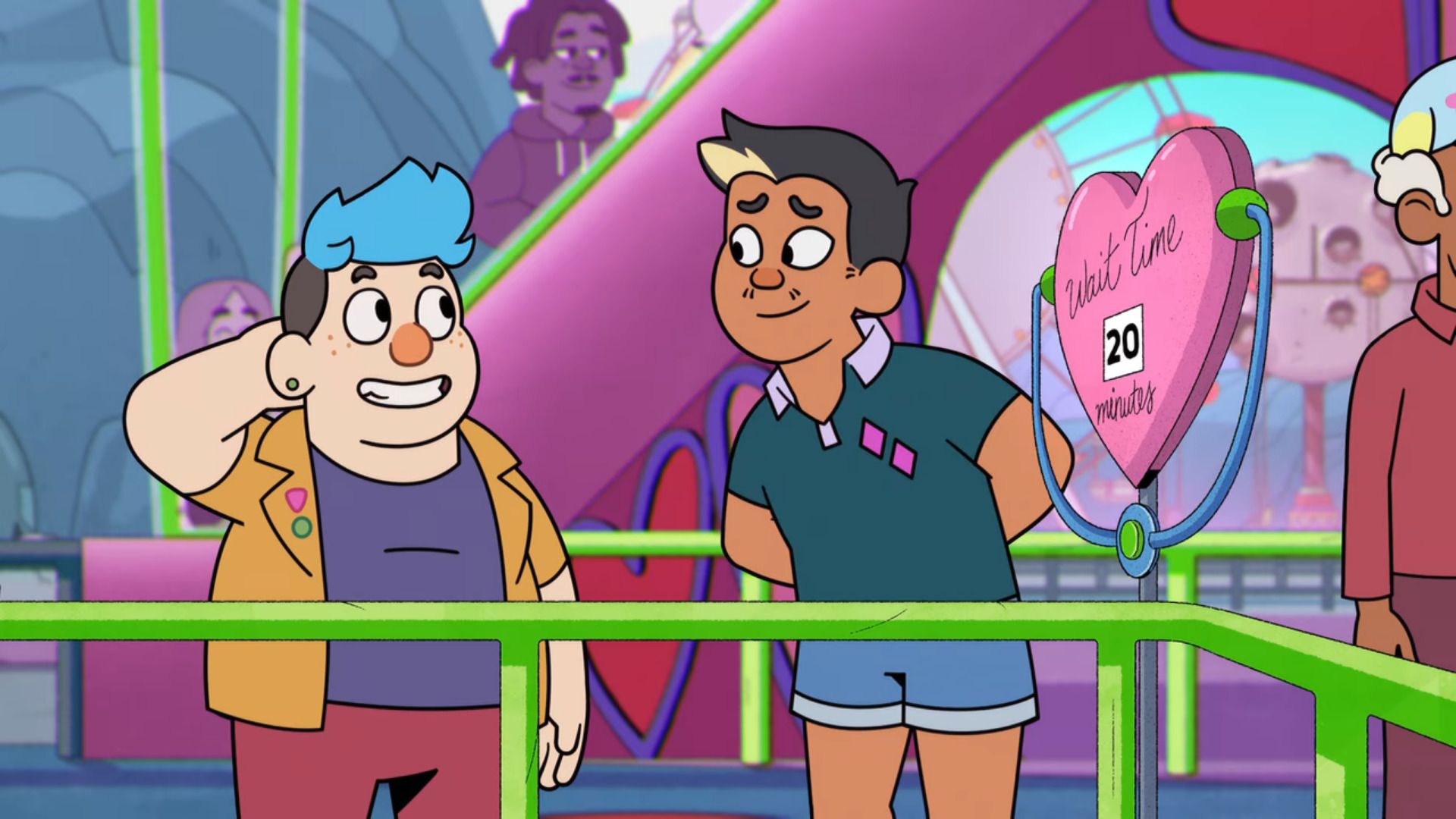“Part of being an actor, but specifically a trans actor, is we get to go out for fewer things. People don’t always consider us for cis roles, and that’s something we need to talk about if it’s ever going to change,” Zach Barack tells me following the release of Dead End: Paranormal Park on Netflix, which pushes forward trans representation in animation.
Barack plays the role of Barney Guttman, a gay, Jewish, trans teenager confident in his identity as he hopes to grow into adulthood with more friends, a deeper connection to his family, and a willingness to accept his own flaws. I caught up with the actor to talk about bringing this character to life, being the first trans actor in the MCU, and how the world of acting is becoming more accepting of trans people, despite still having a long way to go.
“When I read the comics I was taken aback, and not to sound like I’m giving a soundbite, because it was just really well written,” Barack tells me. “For someone who isn’t trans, and my roommate and I even googled Hamish [Steele] to find out if he was, because I feel strongly that queer stories should be written by queer people, and I want to read trans written stories. But if you’re going to do it, do it like this. It speaks truth to what a lot of people’s experiences are, and I know not all of us are kicked out but a lot of us are, and it’s so important to talk about that.
“But I also think there’s value in a parent seeing a show where it’s more nuanced, where it’s ‘Oh, I have a trans kid and I think I’m supporting them, but what I'm actually doing is accepting them and tolerating them.’ That’s so different, and you have to support them, that’s what you sign up for when you’re a parent. Nobody consents to being born, we don’t have that opportunity. So when we end up in the world, it is on the people who brought us into to provide that space if they’re able to and to find those resources. Because we’re all just little people vibing and then all of a sudden you’re out in the world going, ‘Well this sucks!’”
Barney is an out trans man and is surrounded by friends and a family who support him, but Dead End: Paranormal Park seeks to explore how passive toleration isn’t what every young queer person needs or wants. We’re finding ourselves in a world that is still bigoted in so many ways, and will come across obstacles that cis people simply won’t have to deal with. Barney has enough of his family not standing up for him, so he runs away to a spooky theme park and calls it his home, regardless of friends encouraging him to face the music and make up with his family instead of hiding away and hoping it all gets better.
“The least we can get is the love of our parents,” Barack continues. “I really appreciated seeing a narrative that spoke to me, one about a Jewish kid who loves horror, dinosaurs, and just wants to find a home. Beyond identifying with that it was the nuance of not every family necessarily wanting to kick you out, sometimes they just don’t get it, and that’s enough to make you feel so uncomfortable. You have to find family and other spaces.”
Barack tells me he was lucky to grow up in a family who were willing to embrace his identity and do the extra work to accommodate his transition, whether it be providing medical care or ensuring he was in the right headspace to move forward and be the best person he could possibly be. Yet not everyone has that foundation to build upon, and many have come forward to talk about how Dead End: Paranormal Park not only presents an idyllic outlook on the trans experience, but also one that feels real and comes with many of the obstacles people like us are familiar with. Better yet, it also shows parents who might have a trans child that supporting them is an option at all, even if at first you have trouble understanding.
“[Me and Barney] are practically the same person,” Barack laughs. “I’m a bit of a bumbling fool who just wants friends and family and loved stupid stuff like dinosaurs. One thing I identify with less is with his anxiety. He talks about how you just take a deep breath and move through the fear, and I was like, ‘You know Barney, I’ve been in therapy since I was 15 and deep breaths alone have never done it’ but there is something deeply relatable about when you have to move through the world as a trans person. Some things feel like they pale in comparison, and I think you do need to adopt mechanisms and work through fear in a different way.”
Barney might be a trans character, but it doesn’t come to define who he is throughout the show. There is so much more to him, and dealing with prejudice in his family circle is one part of a much larger story. Barack touches on how as a trans actor you can often be asked to portray trans characters who exist to be queer and little else as part of the narrative, but more and more shows are abandoning that shallow idea in favour of something deeper. There’s one scene in the Paranormal Park’s first episode where Barney comes out to his friend Norma, explaining exactly why he’s hidden away and how his identity factors into his own self-inflicted circumstances.
“I feel very lucky, I had access to hormones and surgery, which was part of my journey, but after that it was sort of like, okay so now the only time I feel bad is when someone treats me like shit for being trans,” Barack explains. “I had it going through my head that it’s important to say that Barney actually doesn’t care. That scene is so wonderful because everybody knows, and this is the only place I get to be myself because I’m fine with who I am. It’s my grandma who has the problem, it’s people at school who might have the problem. If I’m given the opportunity to transplant to a space, where that doesn’t have to be a factor, not even about living stealth or anything, but just where it doesn’t complicate how people see me, then I’m gonna thrive. And he does, and that’s such a testament to the fact that we have to exist, and I don’t think that’s a lot we’re asking for.”
As a trans actor inhabiting the role of a trans character, giving the right performance and ensuring it does justice to such an identity is so important to Barack, even if it means holding himself back. “When I was doing that laundry scene, it was the hardest I tried not to cry because it didn’t feel appropriate,” he tells me. “As an actor, you want to lean into what you’re feeling because you’re playing a character and you’re like, if I want to cry, then that means I must because it’s accurate. But on some level, I think the reason I ultimately didn’t was because I was also feeling a lot of joy at the prospect of telling a person that I just knew was going to be okay with me being trans.”
Barack shares similar sentiments to other queer creators I’ve spoken to in the past about how queer stories are often penned by straight cis people who mean well, but ultimately don’t have the agency to do them full justice. “I’m not burning bridges here, but writers on shows who are not trans, I think with the best of intentions, really strive to create narratives that they believe are fostering or trying to exhibit the struggles we have. Unfortunately, the way it misses the mark so often is by saying the hard part of [being trans] is transitioning. Yeah, it is hard, but so is puberty. The hard thing is someone calling me ‘he’ before my voice drops, or being recognised as such, so it was really refreshing to read something like that.”
Before Paranormal Park, Barack made history as the first openly trans character to star in an MCU film, playing the character of Zach Cooper in Spider-Man: Far From Home. The announcement made headlines, with Marvel bigging it up as a huge step forward for comic book movies and how representation is getting better and better. Several years later the reality of this achievement has dawned on Barack, and it’s fascinating to deconstruct that.
“I’ve gone through a lot of emotions about it,” he admits. “I’ve been a little resentful about how much I’d had to talk about a thing I didn’t really get to have an arc in. But that makes sense, it wasn’t what the story is about, and the meaningful things I said about it still stand true, which is that we do exist in the world. Yet there was a feeling of being baited, or toyed with as a viewer because I really thought we were going to get a trans person saying more, and as an actor I would have loved to have a bigger role. It’s also just part of being an actor and it taught me that everybody kind of goes through that, it taught me that trans people will find meaning in these stories, and it taught me that trans people deserve a hell of a lot more.
“We deserve leading roles, and I’m watching some of my friends in other marginalised spaces deal with that in a different way. I find a lot of comfort in that, but also frustration outside of my own identity, but I also see their successes and know we’re working and doing what we can to advocate for marginalised groups. So I think it’s just about solidarity, and identifying with your people.”
Barack doesn’t hold back when it comes to speaking about the realities of working as a trans actor nowadays, and how he often has to fight ten times harder to land auditions when put against cis people working in the same field. Even when trans roles are thrown his way, they are often lined with stereotypes or tragedy that are not only exhausting, but traumatic.
“It’s tempting to like front and posture about how things are going when people ask what I’m working on. I want to be like, ‘So much!’ but the reality is that this summer I’ve mostly just been waiting for this show to come out and auditioning. It’s tough. [Spider-Man] was an interesting experience because it gave me so many lessons on a practical and emotional level. I have gone through this cycle where I was so grateful, but then I was really frustrated, but now I've come full circle back to being grateful. Because I really do love the friendships I got out of it, I love that it was just really cool to see myself on screen. It’s taught me a lot about how this industry works, and it is tough, and definitely harder for us.”
As for trans characters across all mediums, Barack hopes that the picture is changing, but it will only do so through further advocacy, representation, and a willingness to step away from lazy portrayals we’ve seen so many times before. “Nobody is writing a leading role where the conversation about being a trans person doesn’t come up and going, ‘I want a trans person to play it’ because the default is this character is cis. People always say like, well if it isn’t talked about then is this character even trans? I think moving past that is going to be huge. We don’t talk about being trans 24/7. I have a lot of conversations, often really dumb ones, and there are going to be roles I really want to play that have nothing to do with it.
“Do we want to parse whether or not a character is always trans? Sure, and that can be meaningful to people, but it’s not about wanting to play those characters, it’s about wanting to play substantial characters, meaty characters or things that are really fun and play around with different genres. We just don’t get that, and it infuriates me. I had to draw a line in the sand and say, ‘I’m not going for another role that reads distant, angsty trans masc,’ I’m not doing it anymore, I can't because it broke my soul. I just feel the least human ever when reading those because we are not plot devices and I can't be that again when I show up in a two episode arc that is just there to say it’s so tragic when trans people get killed.”
Dead End: Paranromal Park is a brief respite, with animation offering increased opportunities for queer characters than live action because worlds and personalities are allowed to be considered more outlandish. But the reality is that LGBTQ+ are very real, and live action needs to reach a place where these actors are given the respect they deserve.
As for where the character of Barney goes from here, Barack wants to delve even deeper into the messy beauty of his trans experience, while never treating his identity as a vice that stops more complicated and nuanced stories from being told.
“I like that he gets to be a jealous person because that feels really honest. When you’re a young person in a relationship you get mad about the stupidest things. I did, I was probably the most toxic teen ever who got unbelievably jealous and hopped from long relationship to long relationship in high school. I kind of joke that trans masc people go through a fuck boy phase, but I really, really leaned into it, like especially hard. Part of finding yourself is navigating those spaces, but I also really want to see him deal with his own stuff now his family is taking accountability, and I hope he learns to communicate more effectively.”
Dead End: Paranormal Park is now streaming on Netflix.



.jpg)
.jpg)


